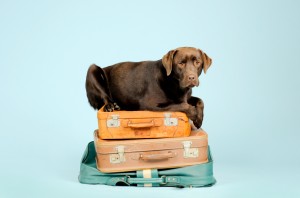We live in a mobile culture. For many of us, relocation to new cities or countries is required for our career or lifestyle. Likewise, our friends and family are generally spread across the country, making travel a necessity. And, let’s not forget those family vacations… Because we are such a traveling bunch, it’s no surprise the issue of safe pet travel is on our minds.
Thankfully, gone are the days when we had to rely solely on scant few airlines to provide only substandard travel care for our pets. Now there are more options that place the health and well-being of our pets as the priority. Many new companies are responding to the demand for better, safer options by tailoring travel to the specific needs of the pet or animal.
In the past decade, a new industry of specialists has emerged that focus on the safe transport of pets. Referred to as Pet Travel Specialists, or Pet Travel Agents, these service providers are equipped to handle every aspect of pet transportation, from ensuring you have the right pre-trip health documentation, to safe and minimal stress transfers, to comfortable flight arrangements.
However, the prospect of putting one’s pet through such an ordeal is daunting and the amount of information and service options, overwhelming. The complexity of pet travel can send anyone into a panic. Many companies present their services as safe, but how do you know for certain?
Questions to Ask Before Your Commit
- Where will my pet be kept on the airplane? Is it heated/cooled, ventilated, and secure?
- What type and size of travel carrier do I need to meet Transportation Security Administration requirements?
- How do you determine which airlines you work with? What standards do you keep with respect to pet holding areas, both on- and off-plane?
- How familiar are you with exotic pets and their special needs and requirements?
- Will you be responsible for helping me understand and meet United States Department of Agriculture (USDA) regulations?
- What is your experience with international travel and relocation? What international vendors do you use, and how do they meet your requirements for pet safety and care?
- How will my pet be handled at transfers? Will he or she be given food and water? What about housing during these stops?
- Do you have references? If so, can I contact them?
For additional suggestions and a list of accredited service providers, the International Pet and Animal Transportation Association’s website is a great resource. You may also wish to contact Pet Air Carrier or Air Animal, two regional pet travel specialists.
Other Pet Travel Considerations
Before traveling with your pet, there are several factors to consider. Your pet’s current state of health is the most important consideration. It’s not only strongly recommended but also required that your pet have a thorough wellness assessment before embarking on a transnational or international journey, as well as ensuring all vaccination requirements have been met. Again, don’t assume one state or country’s rules are applicable to the next.
For example, all imported animals, no matter their current health status, are quarantined in countries such as Australia and New Zealand. Be aware of the particular pet transport guidelines in the state or country where you are traveling.
Do your homework well in advance by visiting the USDA, Animal & Plant Inspection Service, Veterinary Services website. If traveling abroad, check the Foreign Consulate website at least four weeks in advance. The plethora of rules and regulations can be confusing, even here in the States, as many municipalities have their own bylaws regarding animals, specifically wild and exotic pets. When in doubt, consult with your pet travel specialist – that’s what they’re there for.
When moving exotic species, such as reptiles and birds, you will be required to check CITES (or the Convention on International Trade in Endangered Species), which protects not only endangered species but also species that might become endangered due to international trade. CITES permits can take up to 6 months to obtain from US Fish & Wildlife Services. Again, a pet travel agent or specialist will be able to help you navigate these complex requirements.
Finally, make sure it is possible for your pet to travel. Some pets are too old, ill, or prone to stress to safely make a long-distance journey. In the case of a vacation or temporary relocation, consider finding a pet-sitter or someone qualified to care for your pet while you are away.
To schedule a wellness exam and pre-travel vaccinations and screenings, contact our office. We will be happy to help you meet all requirements to safely travel with your pet.


